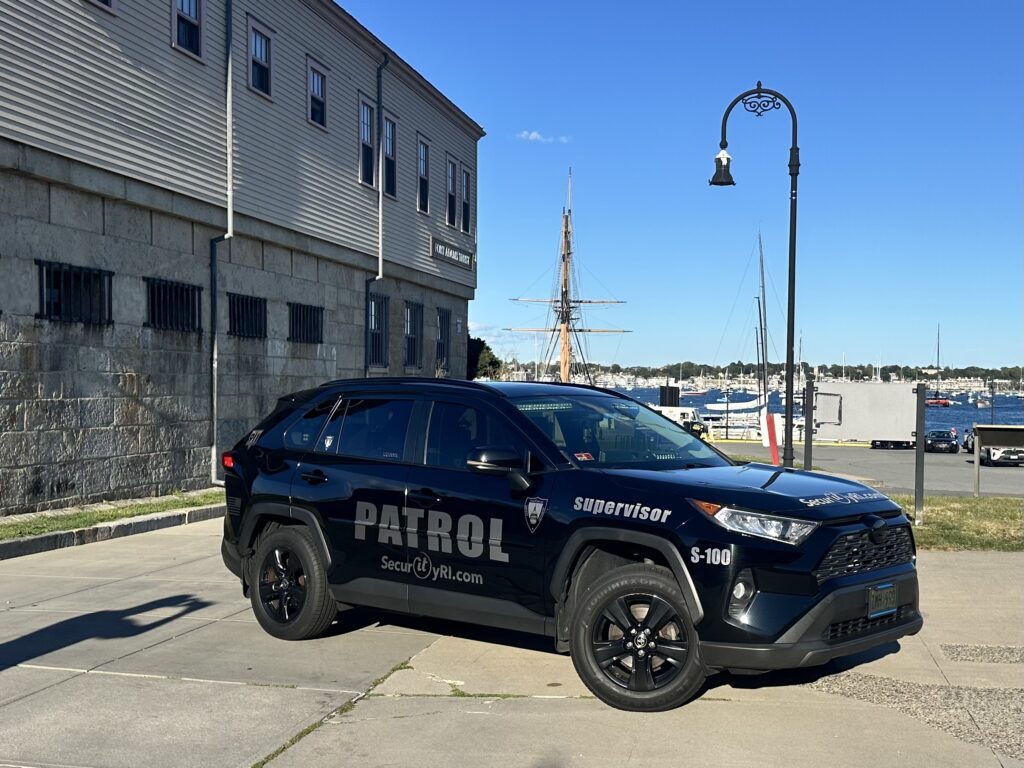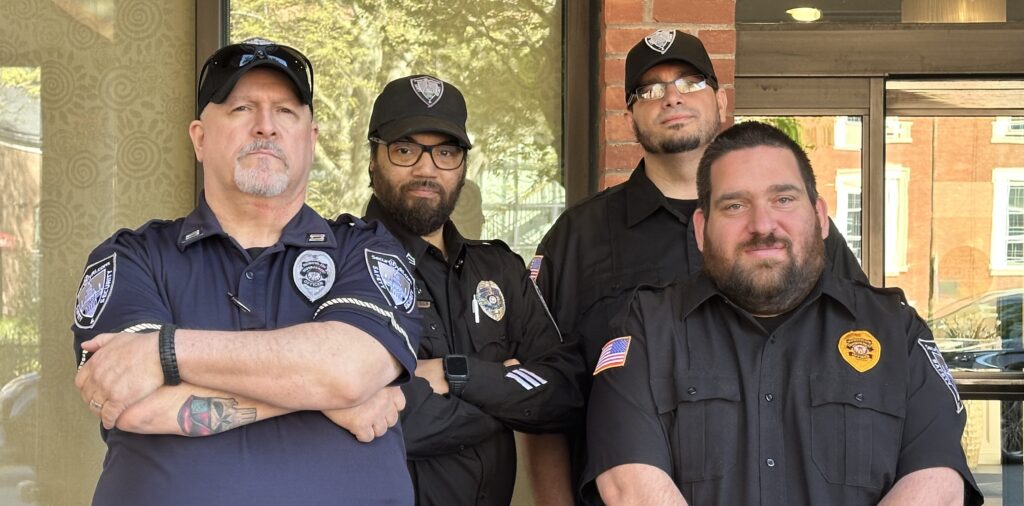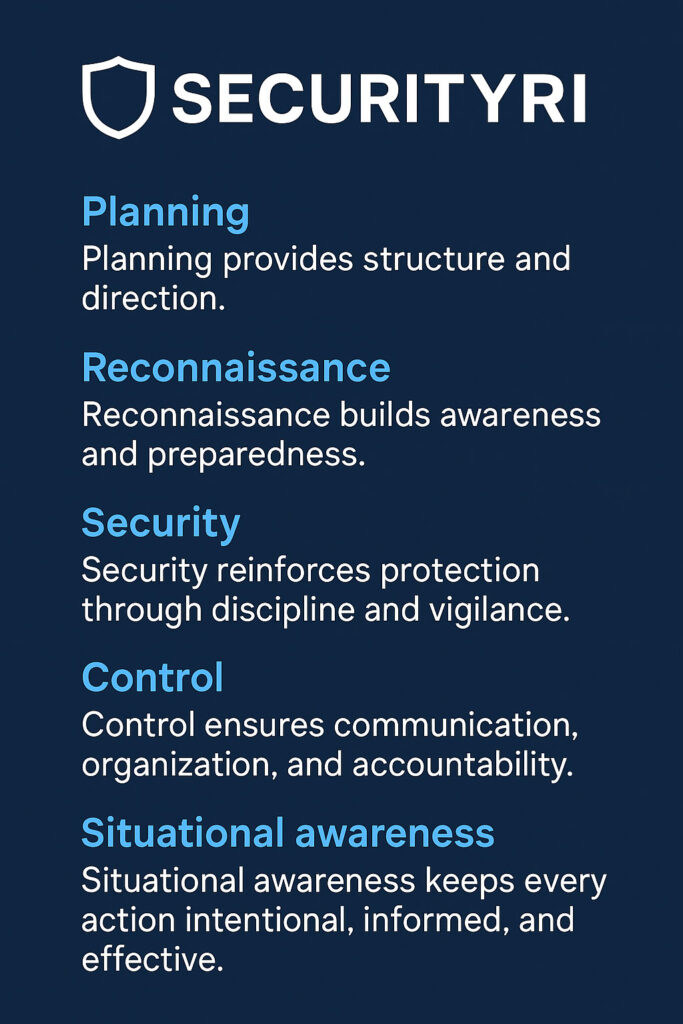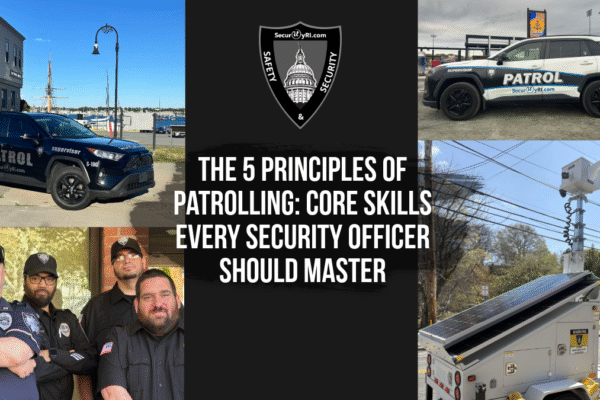The 5 Principles of Patrolling: Core Skills Every Security Officer Should Master
Professional Security Starts With Strong Fundamentals
At SecurityRI, every patrol represents more than presence. It represents trust, preparation, and professionalism. Whether it’s a mobile patrol checking multiple facilities overnight or a dedicated officer protecting a corporate campus, our team follows a structured approach rooted in five timeless fundamentals known as the five principles of patrolling.
These principles shape how officers plan, observe, and respond. They have long been used in law enforcement and military environments, and at SecurityRI we’ve adapted them to the realities of modern private security. By combining these principles with technology, communication, and accountability, our patrol services deliver consistent, reliable protection across Rhode Island and Southern Massachusetts.

1. Planning
Every strong patrol begins with preparation. Our officers start each shift with a clear understanding of their post orders, site layout, emergency contacts, and client priorities. They review recent activity, assess potential risks, and prepare for changing conditions throughout their shift.
Planning transforms patrols from routine to purposeful. When officers understand the expectations of the site, they can anticipate issues before they arise. Whether it involves checking an unsecured access point, verifying lighting coverage, or monitoring high-traffic areas, each action is deliberate and documented.
To support this process, SecurityRI uses technology that ensures accountability. GPS-tracked patrol routes, time-stamped reports, and automated alerts help verify that every patrol is completed on time and according to plan.
2. Reconnaissance
A security officer must understand the environment they protect. Reconnaissance means familiarizing themselves with every corner of the property, from parking lots and entrances to service areas and restricted zones. It also means knowing what is normal for the environment and what is not.
Our officers take the time to learn the property they patrol. They identify blind spots, malfunctioning lights, and irregular activity that might seem minor but can indicate larger issues. This level of observation allows us to act early and reduce risk.
When patrols are performed with strong reconnaissance, prevention becomes the standard. Officers stay alert, confident, and capable of addressing challenges before they develop.

3. Security
The third principle is the core of our mission. Security requires constant vigilance and situational awareness. It involves protecting people, property, and the officer themselves. Maintaining this level of focus means staying alert to changes, communicating effectively, and following safety procedures at all times.
Security officers must avoid predictable routines and vary their patrol routes to maintain coverage and unpredictability. They also communicate regularly with dispatch and supervisors to ensure that any unusual activity is documented immediately.
True security comes from discipline. Each officer’s training, professionalism, and awareness create the reliability that clients expect from security patrol services.

4. Control
Control keeps a patrol organized, coordinated, and effective. It ensures that communication remains clear, incidents are managed correctly, and officers understand their responsibilities at all times. Maintaining control allows a security team to handle situations calmly and prevent unnecessary escalation.
Control extends beyond the individual officer. An operations team must monitor live data from the field, reviewing patrol performance, incident reports, and coverage status in real time. This approach ensures that every patrol is supervised, supported, and aligned with SecurityRI’s standards of professionalism.
When control is consistent, clients can trust that their property is protected through structure, communication, and precision.
5. Situational Awareness
Situational awareness is what connects the other four principles. In security, no two situations are the same. Officers must think critically, act responsibly, and make decisions that balance safety with professionalism. Good judgment often determines the success of a patrol.
An officer may need to decide whether to approach a situation directly, observe and report, or call for support. These choices require clarity, patience, and awareness.
At SecurityRI, we train our team to use their knowledge, experience, and intuition to make the right call in every situation. Situational awareness allows our officers to act confidently, adapt to changing circumstances, and maintain professionalism even in unpredictable environments.
For more on improving safety awareness, see the Department of Homeland Security’s official overview of situational awareness.
Are These Principles Proven and Reliable?
Yes. The five principles of patrolling have been used and tested for decades. They originated in the U.S. Army’s Ranger Handbook and Field Manuals, later adopted by law enforcement, and eventually incorporated into private security training across the country.
Their purpose is universal: to create structure, awareness, and sound decision-making in any patrol operation. These methods have been refined through years of field experience, after-action reviews, and training feedback. They have proven effective in environments ranging from military reconnaissance to community patrol programs and private site protection.
At SecurityRI, we continue to apply these principles because they work. They align perfectly with our technology-driven systems, structured reporting, and field supervision model. By combining proven methods with modern tools, our team provides clients with security that is both reliable and verifiable.
Putting the Principles Into Practice
These principles are more than a training guideline for SecurityRI. They are the framework that shapes how our officers think, communicate, and perform in the field every day.
-
- Planning provides structure and direction.
-
- Reconnaissance builds awareness and preparedness.
-
- Security reinforces protection through discipline and vigilance.
-
- Control ensures communication, organization, and accountability.
-
- Situational awareness keeps every action intentional, informed, and effective.
Together, these principles form a complete system that delivers consistent and measurable results. Each patrol is guided by this framework and supported by technology that enhances accuracy and accountability. Through GPS monitoring, live reporting, and field supervision, we maintain the highest standard of professionalism across every site we protect.
Clients throughout Rhode Island and Southern Massachusetts trust that each SecurityRI patrol is backed by proven methods, modern tools, and a strong sense of responsibility. These principles are what transform a routine patrol into a dependable and professional security operation.



